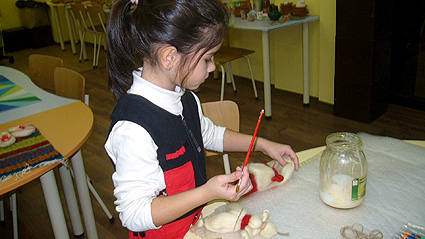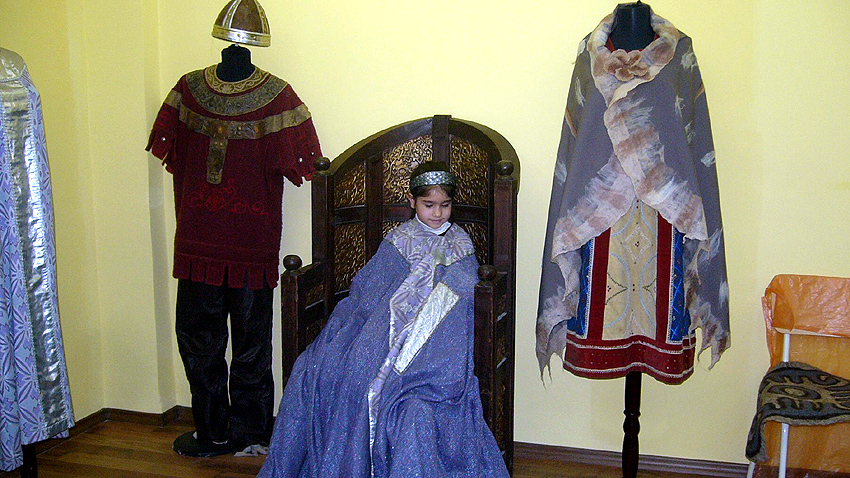“Tradition means relationship and continuity between different generations, rather than a learning which can be grasped from a certain book. It is handed over from one person to another through imitation. When adults keep some traditions alive and present them in an appropriate manner, young people join in with a great deal of enthusiasm”, says for Radio Bulgaria Marieta Nedkova. She is an ancestral craftswoman and a member of the youth association entitled Bulgarian History, Traditions, Arts and Ethnology which was established just over one year ago by a group of creative young Bulgarians who were united by their love with Bulgaria.
“Some of the members of this association are engaged in A Capella singing, accentuating on ancient Bulgarian multi-voice church singing”, explains Marieta Nedkova. “They are trying to promote the Bulgarian traditional culture. The performers are trying to reach a large audience, because all children who live in the Western European countries are taken to church at a very early age. However, our children do not know much about the beautiful Church-Slavonic singing. The effect is quite touching when you listen to all this in a church with great acoustics. ”
Most members of the Bulgarian History, Traditions, Arts and Ethnology Society are aged 29 or under. However, there are people among them who have been occupied with Bulgarian crafts and traditions for quite a while and are committed to pass their passion to young people. Marieta Nedkova herself, who devoted herself to traditional arts and crafts such as leather-working and textile art, spends most of her time promoting the Bulgarian traditional culture.
 “I personally host craft workshops where I try to teach young people become aware of the traditions of the past and make some contemporary works of art based on those ancient traditions. It happens at the National Museum of History since we signed an agreement with the museum aimed at attracting audience. For the purpose, we have launched a Youth Training Center where we opened workshops for the making of pottery, textile and soaps. We are always ready to join other initiatives. For instance, we started to craft martenitsas(twined tasseled red and white thread, viewed as a symbol of spring and health). We also make sourvaknitsa (decorated cornel twig) for Christmas. We will also launch some workshops for wax decorated eggs for Easter, just like in the regions of Velingrad and Ihtiman. Decorated eggs are considered as gifts bestowed on God. On Easter people place them in front of the icons in the Bulgarian churches where they are later consecrated. Each decorated egg is like an open book where people can read what its craftsmen had in mind. Decorated eggs are granted to best men and relatives in the first days of Easter”, says Marieta Nedkova.
“I personally host craft workshops where I try to teach young people become aware of the traditions of the past and make some contemporary works of art based on those ancient traditions. It happens at the National Museum of History since we signed an agreement with the museum aimed at attracting audience. For the purpose, we have launched a Youth Training Center where we opened workshops for the making of pottery, textile and soaps. We are always ready to join other initiatives. For instance, we started to craft martenitsas(twined tasseled red and white thread, viewed as a symbol of spring and health). We also make sourvaknitsa (decorated cornel twig) for Christmas. We will also launch some workshops for wax decorated eggs for Easter, just like in the regions of Velingrad and Ihtiman. Decorated eggs are considered as gifts bestowed on God. On Easter people place them in front of the icons in the Bulgarian churches where they are later consecrated. Each decorated egg is like an open book where people can read what its craftsmen had in mind. Decorated eggs are granted to best men and relatives in the first days of Easter”, says Marieta Nedkova.
The age between 10 and 14 is the perfect time to teach children love the Bulgarian history and traditions. Very young children and their parents also join the workshops. “The parents are interested in what their children do at the workshops and want to touch with their own hands the items crafted there”, says Marieta Nedkova and adds:
“There are other attractions at our youth center as well. The guests of the museum have the opportunity to dress in authentic clothes, typical of the Old Bulgarian films. Currently the National Museum of History keeps the whole stage property of the historical films Khan Asparukh (Ispor) and Prince Boris 1. Our guests can dress up with Prince Boris’s garments and take photos on his throne. Thus, they can learn something about the Bulgarian history. When children come into a direct contact with history they learn it better and easier. For instance, if they enact a historical event, they will learn it for good. Children do not remember dates and events as some type of a catalogue. They remember only what makes impression to them and are later ready to share it with friends. Children do not narrate their history lessons when they use the social networks or communicate with friends. However, they would be always ready to share the knowledge acquired at the history museum or during their practical lessons.”

The young people from the Bulgarian History, Traditions, Arts and Ethnology Society join actively various initiatives organized by related non-governmental organizations which aim at keeping the Bulgarian spirit and traditions alive. For example, last year they took part at the Forefathers’ Days Festival launched by the Varna-based Avitohol Association. The young people travel back to various periods of the Bulgarian Medieval History in the atmosphere of the Pliska National Historical and Architectural Reserve.
English version: Kostadin Atanasov
Photos: courtesy to the Society for Bulgarian History, Traditions, Arts and EthnologyPeople’s best friends will parade today at the Pet Parade in Ruse's Youth Park. All dogs, cats, rabbits, hedgehogs, lizards, turtles, rodents, exotic species, birds are welcome along with their owners to participate in the "All animals..
The Bulgarian "chitalishte", a cultural community center, is a unique institution that has preserved the spirituality and traditions of the Bulgarian nation for centuries . The cultural community center in the town of Razlog named is marking today its..
The mellow days of autumn are the perfect time to take a stroll among the stores lining the Samovodska charshia in Veliko Tarnovo. The old crafts street and marketplace, now an ethnographic and architectural complex, dates back to the mid-19 th..

+359 2 9336 661
